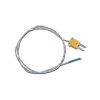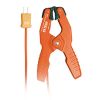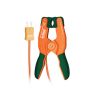Extech SDL350 Hot Wire CFM Thermo-Anemometer/Datalogger
Features
- Probe extends up to 7.05ft (215cm) maximum length with cable
- Stores 99 readings manually and 20M readings via 2G SD card
- Telescoping probe designed to fit into HVAC ducts and other small openings
- Free ground shipping
- Expedited repair and warranty service
- Lifetime technical support
- More
Overview
The Extech Hot Wire CFM Thermo-Anemometer/Datalogger date and time stamps and stores readings on an SD card for easy transfer to a PC. The datalogger measures air velocity and air flow with a telescoping probe designed to fit into HVAC ducts and other small openings. The probe extends up to 7.05 feet maximum length with cable. The meter stores up to 99 readings manually, and 20M readings via the 2G SD card, and adjustable sampling rates range from 1 to 3600 seconds. The type K/J thermocouple input allows for high-temperature measurements.
Additional Functions
- Record/recall min and max readings
- Data hold
- Automatic power off with disable function
- Air velocity m/s range: 0.2 to 25m/s
- Air velocity m/s resolution: 0.01m/s
- Air velocity m/s basic accuracy: ±5%rdg
- Air velocity ft/min range: 40 to 3940ft/min
- Air velocity ft/min resolution: 1ft/min
- Air velocity ft/min basic accuracy: ±5%rdg
- Air velocity MPH range: 0.5 to 45MPH
- Air velocity MPH resolution: 0.01MPH
- Air velocity MPH basic accuracy: ±5%rdg
- Air velocity knots range: 1 to 31knots
- Air velocity knots resolution: 0.01knots
- Air velocity knots basic accuracy: ±5%rdg
- Air velocity km/h range: 0.7 to 72km/h
- Air velocity km/h resolution: 0.01km/h
- Air velocity km/h basic accuracy: ±5%rdg
- CFM( feet3/min) range: 0 to 1,907,000 CFM
- CFM( feet3/min) resolution: 0.001 to 100 CFM
- CMM (meter3/min) range: 0 to 54,000 CMM
- CMM (meter3/min) resolution: 0.001 to 1 CMM
- Temperature range: 32 to 122°F (0 to 50°C)
- Temperature resolution: 0.1°
- Temperature basic accuracy: ±1.5ºF (±0.8ºC)
- Type K temperature range: -148 to 2372°F (-100 to 1300°C)
- Type K temperature resolution: 0.1°
- Type K temperature basic accuracy: ±(0.4% + 1.8°F/1°C)
- Type J temperature range: -148 to 2192°F (-100 to 1200°C)
- Type J temperature resolution: 0.1°
- Type J temperature basic accuracy: ±(0.4% + 1.8°F/1°C)
- Memory: 20 million data records using 2G SD card
- Dimensions: 7.2 x 2.9 x 1.9" (182 x 73 x 47.5mm)
- Weight: 23.1oz (655g)
- (1) Datalogger
- (1) 3.1ft (95cm) fully extended telescoping probe with 3.9ft (120cm) cable
- (6) AA batteries
- (1) SD card
- (1) Hard carrying case
In The News
Source Water Monitoring in Albany, New York: Tracing Water Quality throughout Tributaries
Thousands of US cities pull their drinking water from natural source waters like reservoirs, rivers, and streams, making overall watershed health a key consideration for water providers. In Albany, New York, the Albany Department of Water and Water Supply delivers drinking water to over 100,000 residents as well as monitors and manages the larger drinking water supply watershed. Hannah Doherty, Environmental Specialist at the Albany Department of Water and Water Supply , spends her days working with a small team to monitor the drinking supply and the connected water bodies. Doherty explains, “We’re the first to encounter the water that ends up being the drinking water.
Read MoreWildfire Prevention in the Sierra Nevada Region with the Yuba Watershed Institute
Though recent wildfires have sparked new conversations about wildfire management and response, groups like the Yuba Watershed Institute have been monitoring the forests and water resources of the Sierra Nevada region for decades, managing approximately 5,000 acres of land with the Bureau of Land Management (BLM) and about 7,000 acres in private land partnerships. The goal of the Institute is to work with local communities and land agencies to improve watershed and forestry management through informed practices and public outreach. The goals of the Yuba Watershed Institute are three-fold: Improve the ability of fire suppression agencies like the California Department of Forestry and Fire Protection ( CAL FIRE ) and the US Forest Service.
Read MoreWave Sensors Integration with NexSens Buoys: A Cutting-Edge Solution for Wave Measurment
Real-time wave data supports accurate weather prediction, safe and efficient maritime operations, and provides valuable safety and operating condition information for recreation and commercial fishing. Understanding wave dynamics also helps with the design of protective coastal structures like seawalls, breakwaters, and jetties. It also supports better prediction of their impact on sediment transport and coastal geomorphology. Wave data is a key factor in qualifying and designing offshore wind farms and harnessing kinetic energy for electrical generation. It helps with the understanding of ocean-atmosphere interactions and contributes to studies of sea-level rise and climate change impacts.
Read More













